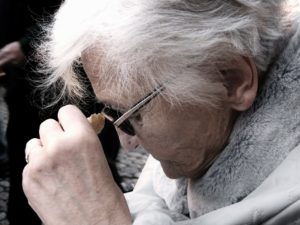A panel of researchers and non-government organizational leaders has determined that physical activity is associated with a reduced risk of Alzheimer’s disease. Being physically active can also help manage symptoms of the disease, according to researchers. The study, published by BMC Public Health, was led by the University of British Columbia’s Okanagan campus.
The study was initiated by a non-government organization in Canada. They wanted to work with scientists to create evidence-based awareness regarding physical activity and its potential to prevent and manage Alzheimer’s disease. The panel conducted systematic reviews of more than 150 previously-published materials related to Alzheimer’s disease, other forms of dementia and physical activity.

Credit: pixabay.com
The panel found that regular physical activity improves daily living and mobility in older adults with Alzheimer’s.
“As there is no current cure for Alzheimer’s, there is an urgent need for interventions to reduce the risk of developing it and to help manage the symptoms,” writes the study’s author, Kathleen Martin Ginis, professor at UBC Okanagan’s School of Health and Exercise Sciences. “After evaluating all the research available, our panel agrees that physical activity is a practical, economical and accessible intervention for both the prevention and management of Alzheimer’s disease and other [forms of] dementia.”
The researchers write that a lack of evidence-based guidelines regarding the use of physical activity to prevent and manage Alzheimer’s disease may create a missed opportunity. Essentially, they believe that many older adults could be motivated to become physically active if they were shown evidence-based materials related to the matter.
Final Statement and Discussion
The panel’s final consensus statement reads as follows:
Regular participation in physical activity is associated with a reduced risk of developing Alzheimer’s disease. Among older adults with Alzheimer’s disease and other dementias, regular physical activity can improve performance of activities of daily living and mobility, and may improve general cognition and balance.
Although the experts do mention that the first sentence of the statement is based exclusively on observational data, they also discuss its scientific possibility. They write, “It is also biologically plausible and consistent with emerging evidence that physical activity can change the structure and function of the brain. In particular, physical activity may mitigate age-related atrophy of the hippocampus, a key brain structure affected by Alzheimer’s disease that is critical for memory function.”

Credit: pixabay.com
The one drawback to the panel’s findings is that they do not specify the different types or amount of physical activity that are necessary to achieve the intended outcomes, particularly for people already suffering from the disease. They mention that further research needs to be conducted on the specifics in order to develop Alzheimer’s-specific physical activity guidelines. This is important because a majority of clinicians are not necessarily confident in Alzheimer’s patients’ ability to meet general physical guidelines for older adults.
However, now that there is a peer-reviewed study advocating the benefits of physicality and its relationship to Alzheimer’s, hopefully older adults will be motivated to positively change their lifestyles, should they desire to.

 Research Panel Suggests Physical Activity Can Help Prevent and Manage Alzheimer’s Disease
Research Panel Suggests Physical Activity Can Help Prevent and Manage Alzheimer’s Disease


 Funeral Favors Offer Visitors a Tangible Memento
Funeral Favors Offer Visitors a Tangible Memento
 “Comeback” by Prince
“Comeback” by Prince
 “Other Side” Documents Woman’s Fight To Die As She Wishes
“Other Side” Documents Woman’s Fight To Die As She Wishes














